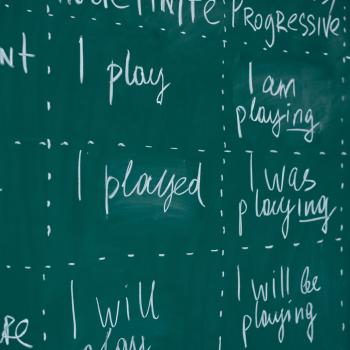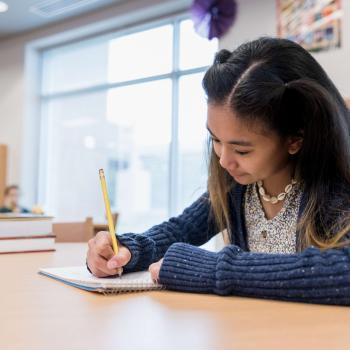Students learn techniques that can aid in memorizing information, play online memory games, and participate in a class memory game to develop and share their own memory strategies.

The Mysteries of Memory: Memorization Techniques That Work

Grades
|
Shared Experiences, Individual Impressions: Buddies Create PowerPoint Stories
K - 2
Lesson Plan
| Recurring Lesson
Stories and snapshots of school-related experiences are the perfect sources of inspiration for students as they create PowerPoint presentations with the help of an older student.

Grades
|
Developing Searching, Skimming, and Scanning Skills With Internet Bingo
4 - 8
Lesson Plan
| Standard Lesson
Student pairs aim to be the first team to call out "bingo" in this lesson in which they use skimming and scanning to locate information about ancient Greece and Rome.

Grades
|
Comparing a Literary Work to Its Film Interpretation
9 - 12
Lesson Plan
| Standard Lesson
Students will really get into the swing of things as they analyze the text and film versions of Edgar Allan Poe's story, "The Pit and the Pendulum."

Grades
|
Spelling Patterns "Go Fish" Card Game
4 - 8
Lesson Plan
| Standard Lesson
Students use sets of words that share a spelling pattern to create a card game like "Go Fish" and then play the game in groups, helping them improve their spelling.

Grades
|
Let's Read It Again: Comprehension Strategies for English-Language Learners
K - 2
Lesson Plan
| Standard Lesson
Help Spanish-speaking English-language learners unlock the mysteries of their new language by using a bilingual book to recognize unfamiliar words and construct meaning from the text.

Grades
|
Improve Comprehension: A Word Game Using Root Words and Affixes
6 - 8
Lesson Plan
| Standard Lesson
Students study common root words and affixes, improve their comprehension and spelling, and make a card game in which they form words with a prefix, root word, and suffix.

Grades
|
Crit Lit for Kids: From Critical Consciousness to Service Learning
6 - 8
Lesson Plan
| Unit
Students take their ideas from the classroom page to the community pavement when they participate in a service-learning project based on their multimedia presentations.

Grades
|
Writers' Workshop: The Biographical Sketch
3 - 5
Lesson Plan
| Unit
Students use the faces and places they learn about in their research to write a biography about a contemporary or historical figure.

Grades
|
Becoming History Detectives Using Shakespeare's Secret
6 - 8
Lesson Plan
| Standard Lesson
Is the case closed on the authorship of Shakespeare's plays? Student history detectives explore the evidence for and against one of the possible alternatives, Edward deVere, using the novel Shakespeare's Secret plus a variety of online sources.

Grades
|
Reading and Writing About Pollution to Understand Cause and Effect
3 - 5
Lesson Plan
| Standard Lesson
Students get to write a whale of a tale when they complete a graphic organizer sequencing the journey of a mountain fish to a polluted waterway.

Grades
|
Guided Comprehension in Action: Teaching Summarizing With the Bio-Cube
6 - 8
Lesson Plan
| Recurring Lesson
Students learn the ins and outs of writing biographies by researching a contemporary or historical figure and writing a summary.

Grades
|
Read a Song: Using Song Lyrics for Reading and Writing
K - 2
Lesson Plan
| Standard Lesson
This lesson will be music to the students' ears when they hear that they get to read song lyrics and compose original lyrics for a familiar song.

Grades
|
Empowered Fiction Writers: Generating and Organizing Ideas for Story Writing
6 - 8
Lesson Plan
| Standard Lesson
Do their minds go blank when they confront a blank piece of paper? Speedwriting can help students get started on writing and come up with topics to write about. They can then incorporate their key ideas and phrases into a narrative with the help of a graphic story organizer.

Grades
|
Developing Story Structure With Paper-Bag Skits
6 - 8
Lesson Plan
| Unit
Lights, camera, action, and a bit of mystery! In this lesson, students use mystery props in a skit bag to create and perform in short, impromptu skits.

Grades
|
Whose Shoes? Using Artifacts to Teach Reading and Rhyming Patterns
1 - 2
Lesson Plan
| Standard Lesson
If the shoe fits… Actually, any shoe will fit this lesson, and the Artifact Analysis Questions provided will help students see it in a whole new way. Several rhyming texts take the shoe theme a step further, and introduce activities to increase students' awareness of rhyming words.

Grades
|
Safety Tips With Officer Buckle and Gloria
K - 2
Lesson Plan
| Standard Lesson
Safety first! In this lesson, students take the lessons taught by Officer Buckle and Gloria to heart as they explore safety in everyday situations.

Grades
|
Get Cooking With Words! Creating a Recipe Using Procedural Writing
3 - 5
Lesson Plan
| Standard Lesson
Students participate in read-alouds of books that exemplify effective word choice, explore how to choose words to best communicate an idea, and then write explicit instructions for a recipe.

Grades
|
Casting Shadows Across Literacy and Science
K - 2
Lesson Plan
| Standard Lesson
Shadows, shadows, everywhere! In this lesson, students read fiction, informational text, and poetry about shadows to extend their knowledge of the concept before casting their own shadow poetry.

Grades
|
This is My Story: Encouraging Students to Use a Unique Voice
3 - 5
Lesson Plan
| Standard Lesson
What did the wolf think of Red Riding Hood? Once Upon a Fairy Tale offers his side of the story and more, providing vivid examples of how voice enlivens narrative. After comparing versions of the story, students apply the concept of voice to Fractured Fairy Tales and other writing activities.